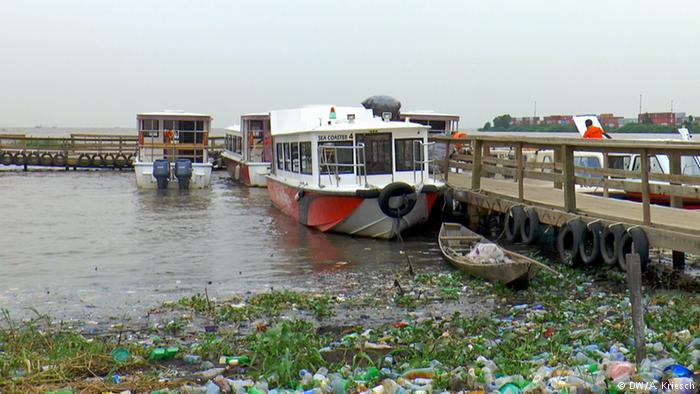The Lagos State Government on Wednesday, February 12, 2020 embarked on a clean-up exercise and campaign against marine waste, in its bid to enhance safety on the waterways.

Gov. Babajide Sanwo-Olu, at the launch of the Waterways Clean-Up Campaign by the Lagos State Waterways Authority (LASWA) in Lagos, expressed concern about the way huge volume of waste got into the water bodies.
The governor, who was represented by the Commissioner for Transportation, Dr Frederic Oladeinde, said that waterways clean-up campaign was a demonstration of his administration’s commitment to safe, clean and friendly water transportation.
“In order to sustain the management of the multifaceted marine litters on our waterways, it has become very necessary for us all to come together and proffer lasting solutions to the sources of the challenges, for an improved water transportation system.
“Government investment in water transportation would be a waste if we fail to formulate a policy that would ensure regular clean-up and protection of our waterways against all forms of environmental degradation and abuse.
“It is unfortunate to note that Lagos, with all its endowed aquatic resources, with its 187km-long Atlantic coastal line and extensive lagoon system which constitutes about 22 per cent of its land area, is massively affected by activities of litters and environmental degradation.
“These are visible across all our coastal lines as a result of various human activities. This calls for serious concern and concerted efforts from the government toward reversing this ugly trend,” Sanwo-Olu said.
The governor commended LASWA and its sister agencies as well as all stakeholders that joined in the clean-up campaign, aimed at enlightening the public on the danger inherent in indiscriminate waste disposal into the lagoon.
He said that the campaign would reduce accident risk, ensure free flow of movement and safety on waterways, as well as protect the aquatic animals among other benefits.
Sanwo-Olu, who noted that efficient traffic management and transportation system occupied significant position in his administration’s six-pillar Development Agenda, said that water transportation remained a major component of his multi-model transport system.
“This administration has continued to invest in waterway transportation in our determination to unlock traffic gridlocks often experienced in the metropolis, ease commuters’ movement, as well as promote the growth of commerce and economic activities.
“We are committed to save travel time and reduce traffic-induced stress to the barest for healthy living of our people,” he said.
According to him, the menace of marine litters is rooted in inappropriate solid waste disposal, management practices, product design that does not consider life cycle impacts and accidental loss.
He said that intentional dumping of fishing gears or ship generated waste as well as poor public understanding of the potential consequences of their actions on waterways were part of the causes.
Sanwo-Olu said that the clean-up also became necessary to protect people living in riverine rural communities, whose livelihoods depended largely on water bodies.
He urged relevant stakeholders along coastal lines to stop forthwith any form of pollution, waste disposal and other forms of abuse on the waterways.
In his welcome address, the General Manager of LASWA, Mr Oluwadamilola Emmanuel, said apart from the clean-up, the authority was also inaugurating a research on the waste.
Emmanuel said that the research would determine the sources, composition and estimate of marine litters as well as debris on the waterways.
“Today is another milestone on our journey toward the development of water transport in Lagos State, as we gather here to launch the waterways clean-up campaign aimed at creating awareness about the danger of marine waste.
“We are here also to commission the conduct of an holistic research that will determine the sources, composition and estimate of marine litters as well as debris on our waterways.
“The problems caused by marine litters are multifaceted, but essentially rooted in the inadequate solid waste management practices and poor public understanding of the potential consequence of their action.
“Therefore, the need to regularly sensitise and educate the public, especially those living in coastal communities as well as business owners along the shorelines of Lagos lagoon, has become imperative,” he said.
According to him, the problem is no longer the issue, proffering solutions to the critical challenge is the main cause of concern.
“So, this is the reason we are here today to form a synergy towards solving this perennial issue affecting our aquatic resource and hindering the development of our waterways,” he said.
The general manager said that the waterways cleanup exercise, kick started at Five Cowries Terminal, Falomo, Ikoyi would be done in four zones, namely: Ikorodu, Ebute Ero, Sabokoji and Falomo.
Emmanuel said that the participants in the campaign had been grouped for an effective, efficient and a result-oriented sensitisation and clean-up.
The general manager appreciated the partners in the sensitisation campaign, saying that the collaboration would aid sustainability.
The exercise was carried out with the collaboration of some non-profit organisations which include Temple Management Company, Food and Beverages Recycling Alliance (FIBRA) and I love My Lagoon.
The clean-up was also supported by the Lagos State Waste Management Authority (LAWMA), the Lagos State Safety Commission, the Lagos State Ferry Services (LAGFERRY), Five Cowries Initiative and several other stakeholders.
The stakeholders, who took turns to commend LASWA for the clean-up campaign, stressed the need for partnership between the government and private sector in addressing the problem.
LASWA, having grouped the stakeholders, dispersed them to various communities along the coastal line for the clean-up campaign.
By Yemi Adeleye
